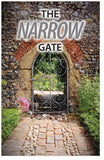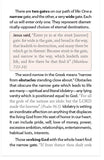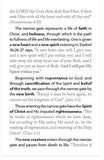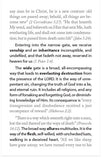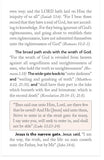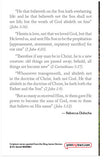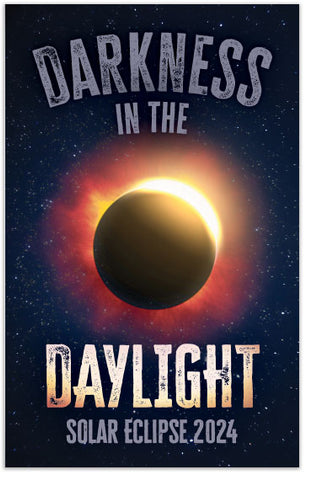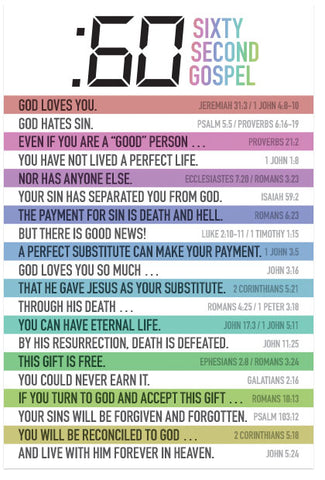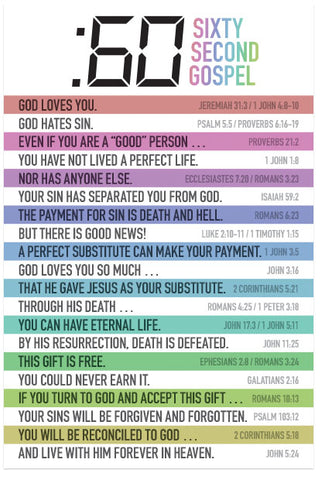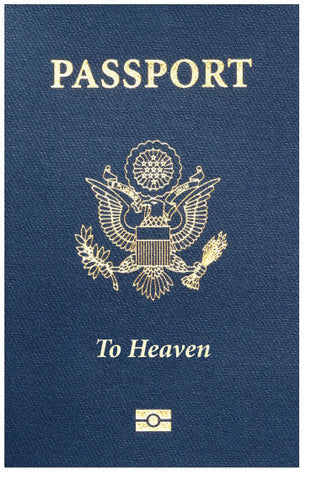The Narrow Gate (KJV)
Special-Order Folded Tract
 NOTE: This item is custom-printed to order (click for more details).
NOTE: This item is custom-printed to order (click for more details).
This tract is from our print-on-demand library, and is not kept in stock. Select the options below, and we will custom-print a batch just for you. Because this item is custom-printed, you can add your custom imprint to the back page at no extra cost.
- Estimated shipping date: Thursday, March 26 (Click for more details)
- SKU:
- Discounts: Discount coupons do not apply to this item
- Format: Folded Tract
- Size: 3.5 inches x 5.5 inches
- Pages: 6
- Imprinting: Available with 5 lines of custom text
- Version: KJV
- Returns: Because this item is custom-printed to order, it cannot be returned.
Show all item details
The full text of this tract is shown below in the KJV version. (Do you want to print this tract in a different version than the one listed? Contact us and let us know what you're looking for—we may be able to create the alternate version for you at no charge.)
There are two gates on our path of life: One a narrow gate, and the other, a very wide gate. Each of us will enter only one. They represent diametrically-opposed choices of eternal destinations.
Jesus said, “Enter ye in at the strait [narrow] gate: for wide is the gate, and broad is the way, that leadeth to destruction, and many there be which go in thereat: Because strait is the gate, and narrow is the way, which leadeth unto life, and few there be that find it” (Matthew 7:13-14).
The word narrow in the Greek means “narrow from obstacles standing close about.” Obstacles that obscure the narrow gate which leads to life are many—spiritual and literal idolatry—any lying vanity which is positioned equal to God. “For all the gods of the nations are idols: but the LORD made the heavens” (Psalm 96:5). Idolatry is setting an inordinate affection on anything that displaces the living God from His seat of honor in our heart. It can include pride, self, love of money, power, excessive ambition, relationships, entertainments, habitual lusts, interests.
Those seeking God with the whole heart find the narrow gate. “If from thence thou shalt seek the LORD thy God, thou shalt find Him, if thou seek Him with all thy heart and with all thy soul” (Deuteronomy 4:29).
The narrow gate represents a life of faith in Christ, and holiness, through which is the path to fullness of life and life everlasting. One is given a new heart and a new spirit entering in. Ezekiel 36:26-27 says, “A new heart also will I give you, and a new spirit will I put within you: and I will take away the stony heart out of your flesh, and I will give you an heart of flesh. And I will put My Spirit within you.”
Beginning with repentance to God, and through sanctification of the Spirit and belief of the truth, we pass through the narrow gate by the new birth. “Except a man be born again, he cannot see the kingdom of God” (John 3:3).
Those entering the narrow gate have the Spirit of Christ and His imputed righteousness. “Not by works of righteousness which we have done, but according to His mercy He saved us, by the washing of regeneration, and renewing of the Holy Ghost” (Titus 3:5).
The new creature enters through the narrow gate and passes from death to life. “Therefore if any man be in Christ, he is a new creature: old things are passed away; behold, all things are become new” (2 Corinthians 5:17). “He that heareth My word, and believeth on Him that sent Me, hath everlasting life, and shall not come into condemnation; but is passed from death unto life” (John 5:24).
Entering into the narrow gate, we receive sonship and an inheritance incorruptible, and undefiled, and that fadeth not away, reserved in heaven for us (1 Peter 1:4).
The wide gate is a broad, all-encompassing way that leads to everlasting destruction from the presence of the LORD. It is the way of unrepentant sin, changing the truth of God into a lie, and eternal ruin. It includes all religions, and any form of forsaking and forgetting God, or diminishing knowledge of Him. Its consequence is “every transgression and disobedience received a just recompence of reward” (Hebrews 2:2).
“There is a way which seemeth right unto a man, but the end thereof are the ways of death” (Proverbs 14:12). The broad way allures multitudes. It is the way of the flesh, self-willed, with unchecked lusts, walking in a deceived heart. “All we like sheep have gone astray; we have turned every one to his own way; and the LORD hath laid on Him the iniquity of us all” (Isaiah 53:6). “For I bear them record that they have a zeal of God, but not according to knowledge. For they being ignorant of God’s righteousness, and going about to establish their own righteousness, have not submitted themselves unto the righteousness of God” (Romans 10:2-3).
The broad path ends with the wrath of God: “For the wrath of God is revealed from heaven against all ungodliness and unrighteousness of men, who hold the truth in unrighteousness” (Romans 1:18). The wide gate leads to “outer darkness” and “wailing and gnashing of teeth” (Matthew 8:12; 25:30), and “shall have their part in the lake which burneth with fire and brimstone: which is the second death” (Revelation 20:14-15; 21:8).
“Then said one unto Him, Lord, are there few that be saved? And He [Jesus] said unto them, Strive to enter in at the strait gate: for many, I say unto you, will seek to enter in, and shall not be able” (Luke 13:23-24).
Jesus is the narrow gate. Jesus said, “I am the way, the truth, and the life: no man cometh unto the Father, but by Me” (John 14:6).
“He that believeth on the Son hath everlasting life: and he that believeth not the Son shall not see life; but the wrath of God abideth on him” (John 3:36).
“Herein is love, not that we loved God, but that He loved us, and sent His Son to be the propitiation [appeasement, atonement, expiatory sacrifice] for our sins” (1 John 4:10).
“Therefore if any man be in Christ, he is a new creature: old things are passed away; behold, all things are become new” (2 Corinthians 5:17).
“Whosoever transgresseth, and abideth not in the doctrine of Christ, hath not God. He that abideth in the doctrine of Christ, he hath both the Father and the Son” (2 John 1:9).
“But as many as received Him, to them gave He power to become the sons of God, even to them that believe on His name” (John 1:12).
— Rebecca Didocha


